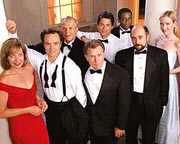After exceptional seasons that have raised the television bar to heights so altitudinous that they practically induce vertigo, the season finales of The Sopranos and The West Wing sucked.
Let’s start with The West Wing. It all began when Mrs. Landingham, President Bartlett’s innocuous secretary, was killed by a drunk driver in the second to last episode of the season. In the final episode, entitled “Two Cathedrals,” the prez must not only tell the world that he has MS and that he hid it from voters, but he must also attend the funeral of his beloved Mrs. Landingham. Meanwhile, back at the Hall of Justice, C.J., Sam, Toby and Josh plot last-minute damage control. And they still don’t know whether their prez will seek a second term.
A series of flashbacks peppers the episode as Bartlett recalls his early encounters with Mrs. Landingham. Apparently, Mrs. Landingham worked for his father who was the sinister headmaster of a boarding school that the young Jed attended. Thanks to her prodding, we see early signs of the politically correct issue-minded public servant Jed will eventually become.
And then there’s the “cathedral” scene. After the funeral and alone in a church, the prez admonishes God in both English and Latin, spitefully announcing that he won’t seek a second term. And then, in the ultimate act of defiance, President Bartlett lights a cigarette, takes a drag, and then steps on it right there in the lord’s house of worship. (The blasphemous moment is accented by its allusion to an earlier vignette when the young Jed’s father reproaches him for finding a cigarette butt in the school’s chapel.)
Later that evening, the ghost of Mrs. Landingham visits Bartlett in the Oval Office. Thanks to her prodding, he tacitly decides to run for office again. Of course, we’ll have to wait until September for confirmation, but, like Mrs. Landingham, we know he’ll do the right thing.
Needless to say, The West Wing has never been the picture of subtlety. Swelling music and a cynic-less faith in the system make the series one of the most unrealistic hours on television. But when the president of the United States starts speaking in Latin and seeing dead people, the Aaron Sorkin has gone too far.
On the other end of the dramatic spectrum is The Sopranos. Between Dr. Melfi’s rape and the Ba Da Bing stripper’s murder, the last 12 episodes have provided some of the most unflinching and unromantic depictions of violence TV has ever seen. Specifically focusing on violence against women, The Sopranos hasn’t always been easy to watch, but it has been provocative and exciting, providing the most unconventional television fare.
Unfortunately, ignoring conventions isn’t always a good thing.
In the third season’s final episode, entitled “An Army of One,” David Chase abandoned all of the tropes of the genre, including some necessary ones. Rather than tying up loose ends, he used the hour to plant the seeds for future plot lines, but not in the standard dangling-off-the-cliff manner. With the exception of the Jackie Jr. whack – an understated shot in the back of the head – the episode felt more like a season premiere: tension between Paulie and Ralphie was established; an undercover FBI agent befriended Adriana; and Meadow realized that her father was probably somehow responsible for Jackie Jr.’s death.
With the soil still damp from these freshly planted plot lines, the season that was overflowing with hard-boiled violence culminated with Uncle Junior singing opera as Meadow tosses bits of bread at him. This time David Chase has gone too far.
